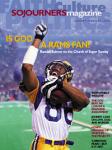Street Person, Portland, Maine
circa 1965
In rags, talking to himself, gesticulating
mildly, a man not yet ravaged enough to not call young
is walking through town, shirt buttons hanging
or fallen, jeans ground-in dirt-sheen, shoes
over at the heel, at the sole. It is still too early
for hippies, and the beatniks have aged into something
dapper or resumed the staid. He might be stoned, but again,
he looks poor first, his smile, very small, calling
to none of us. What holds my eyes are his dogs—
there must be seven or eight of them, every one
likewise a ragamuffin with a smile bigger than his
and a tail fanning where they stand paused
at the corner, traffic rushing past. Yellow-gold,
mottled, spotted, gray to black, red to brown, dappled
—not a single neck leashed, not a one heeling,
cowed or cowering, but all in a gaggle at his knees, close
as a garment, free as a garment flowing, at the center of which
—Does he say something to them? It is hard to tell.—
he looks both ways when an opening approaches, like a boy
who has listened to his mother, and the whole
congregation follows his first long stride out over the gutter
to the other side. Wreck of a young man somehow
between institutions? Or ruin of a man who threw
his good clothes off, told his father what he thought of him,
and as he passed through the wilderness of the world
couldn't help but hold what followed?
Linda McCarriston's most recent collection of poetry is Little River: New and Selected Poems (Salmon Publishing, 2000). She teaches creative writing at the University of Alaska, Anchorage.

Got something to say about what you're reading? We value your feedback!